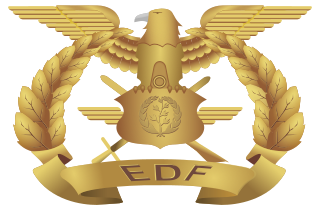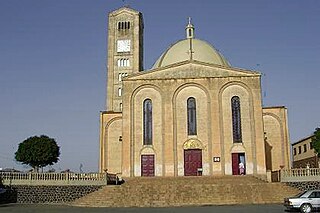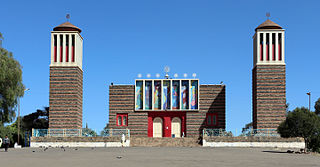Twenty-first century
Years in Africa | |
|---|---|
| Sovereign states |
|
States with limited recognition | |
Dependencies and other territories |
|
This is a timeline of History of Eritrea . Each article deals with events in Eritrea in a given year.

Eritrea is an ancient name, associated in the past with its Greek form Erythraia, Ἐρυθραία, and its derived Latin form Erythræa. This name relates to that of the Red Ocean, then called the Erythræan Sea, from the Greek for "red", ἐρυθρός, erythros. But earlier Eritrea was called Mdre Bahri. The Italians created the colony of Eritrea in the 19th century around Asmara and named it with its current name. After World War II, Eritrea annexed to Ethiopia. Following the communist Ethiopian government's defeat in 1991 by the coalition created by various armed groups notably the EPLF and the TPLF among others, Eritrea declared its independence. Eritrea officially celebrated its 1st anniversary of independence on May 24,1994.

Sources disagree as to the current population of Eritrea, with some proposing numbers as low as 3.6 million and others as high as 6.7 million. Eritrea has never conducted an official government census.

The Eritrean Defence Forces (EDF) are the combined military forces of Eritrea composed of three branches: Eritrean Army, Eritrean Air Force and Eritrean Navy. The Army is by far the largest, followed by the Air Force and Navy. The Commander-in-Chief of the EDF is the President of Eritrea. Their military role stems from Eritrea's strategic geographical location, located on the Red Sea with a foothold on the Bab-el-Mandeb strait.

Asmara, or Asmera, is the capital and most populous city of Eritrea, in the country's Central Region. It sits at an elevation of 2,325 metres (7,628 ft), making it the sixth highest capital in the world by altitude and the second highest capital in Africa. The city is located at the tip of an escarpment that is both the northwestern edge of the Eritrean Highlands and the Great Rift Valley in neighbouring Ethiopia. In 2017, the city was declared as a UNESCO World Heritage Site for its well-preserved modernist architecture. According to local traditions, the city was founded after four separate villages unified to live together peacefully after long periods of conflict. Asmara had long been overshadowed by nearby Debarwa, the residence of the Bahr Negash or the governor of the coastal province, however it still existed as a major settlement for over half a millennium and enjoyed some importance as it stood on the trade route to Massawa. Asmara first rose to prominence during the 20th century, when it became capital of Italian Eritrea. Under Italian rule the city of Asmara experienced rapid urbanization and modernization.

Isaias Afwerki is an Eritrean politician and partisan who has been the president of Eritrea since shortly after he led the Eritrean People's Liberation Front (EPLF) to victory in 24 May 1991, ending the 30-year-old war for independence from Ethiopia. In addition to being president, Isaias has been the chairman of Eritrea's sole legal political party, the People's Front for Democracy and Justice (PFDJ). As Eritrea has never had a functioning constitution, no elections, no legislature and no published budget, Isaias has been the sole power in the country, controlling its judiciary and military. Hence, scholars and historians have long considered him to be a dictator, described his regime as totalitarian, by way of forced conscription; the United Nations and Amnesty International cited him for human rights violations. In 2023, Eritrea ranked 174th out of 180 countries on the Press Freedom Index.

The Eritrea national football team represents Eritrea in men's international football and it is controlled by the Eritrean National Football Federation (ENFF). It is nicknamed the Red Sea Boys. It has never qualified for the finals of the FIFA World Cup and the Africa Cup of Nations. Local side Red Sea FC are the main supplier for the national team and the team represents both FIFA and Confederation of African Football (CAF).

The Eritrean–Ethiopian War, also known as the Badme War, was a major armed conflict between Ethiopia and Eritrea that took place from May 1998 to June 2000.

Eritrean cuisine is based on Eritrea's native culinary traditions, but also arises from social interchanges with other regions. The local cuisine, despite featuring influences of both the Ottoman and Italian cuisines, shares similarities with the cuisine of neighboring Ethiopia and the cuisines from other African countries in the region.

The Eritrean War of Independence was a war for independence which Eritrean independence fighters waged against successive Ethiopian governments from 1 September 1961 to 24 May 1991.

The Eritrean Catholic Church or Eritrean Eastern Catholic Church is a sui iuris (autonomous) Eastern Catholic church based in Eritrea. As a particular church of the Catholic Church, it is in full communion with the Holy See. It was established in 2015 when its territory was separated from the Ethiopian Catholic Church. The church is organized under a metropolitan bishop who exercises oversight of a number of suffragan dioceses. In its liturgical services, it uses the Alexandrian Rite in the Ge'ez language.

The Eritrean Civil Wars were two conflicts that were fought between competing organizations for the liberation of Eritrea.

Religion in Eritrea consists of a number of faiths. The two major religions in Eritrea are Christianity and Islam. However, the number of adherents of each faith is subject to debate. Estimates of the Christian share of the population range from 47% and 63%, while estimates of the Muslim share of the population range from 37% to 52%.

Eritrea ( ERR-ih-TREE-ə or -TRAY-; Tigrinya: ኤርትራ, romanized: Ertra, pronounced[ʔer trä], officially the State of Eritrea is a country in the Horn of Africa region of Eastern Africa, with its capital and largest city at Asmara. It is bordered by Ethiopia in the south, Sudan in the west, and Djibouti in the southeast. The northeastern and eastern parts of Eritrea have an extensive coastline along the Red Sea. The nation has a total area of approximately 117,600 km2, and includes the Dahlak Archipelago and several of the Hanish Islands.

Italian Eritreans are Eritrean-born citizens who are fully or partially of Italian descent, whose ancestors were Italians who emigrated to Eritrea during the Italian diaspora, or Italian-born people in Eritrea.

Italian Eritrea was a colony of the Kingdom of Italy in the territory of present-day Eritrea. The first Italian establishment in the area was the purchase of Assab by the Rubattino Shipping Company in 1869, which came under government control in 1882. Occupation of Massawa in 1885 and the subsequent expansion of territory would gradually engulf the region and in 1889 borders with the Ethiopian Empire were defined in the Treaty of Wuchale. In 1890 the Colony of Eritrea was officially founded.

The Eritrean Orthodox Tewahedo Church is one of the Oriental Orthodox Churches with its headquarters in Asmara, Eritrea. Its autocephaly was recognised by Pope Shenouda III of Alexandria, Pope of the Coptic Orthodox Church, after Eritrea gained its independence from Ethiopia in 1993. Thus, the Eritrean Church accords a primacy of honor to the Coptic Church.
Eritrean Americans are an ethnic group of Americans who are of full or partial Eritrean national origin, heritage and/or ancestry.
Eritrean Canadians are a hyphenated ethnicity of Canadians who are of full or partial Eritrean national origin, heritage and/or ancestry, Canadian citizens of Eritrean descent, or an Eritrea-born person who resides in Canada. According to the 2021 Canadian census, 36,290 Canadians reported Eritrean ancestry.

Visitors to Eritrea must obtain a visa from one of the Eritrean diplomatic missions, unless they come from one of the visa exempt countries or countries eligible for visa on arrival.

The Eritrean–Ethiopian border conflict was a violent standoff and a proxy conflict between Eritrea and Ethiopia lasting from 1998 to 2018. It consisted of a series of incidents along the then-disputed border; including the Eritrean–Ethiopian War of 1998–2000 and the subsequent Second Afar insurgency. It included multiple clashes with numerous casualties, including the Battle of Tsorona in 2016. Ethiopia stated in 2018 that it would cede Badme to Eritrea. This led to the Eritrea–Ethiopia summit on 9 July 2018, where an agreement was signed which demarcated the border and agreed a resumption of diplomatic relations.